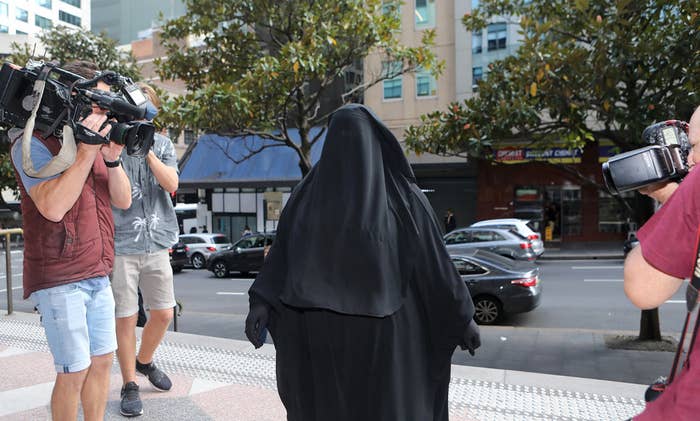
A Muslim woman who was ordered to pay a quarter of a million dollars after she unsuccessfully sued police over a raid on her home has had her appeal against the decision dismissed.
Moutia Elzahed argued she had suffered a miscarriage of justice in the case when she was barred from giving evidence while wearing a niqab, which covers every part of the body and face except for a person's eyes.
Elzahed, along with her husband, Hamdi Alqudsi (who has been convicted of assisting men to travel to Syria to fight), and two sons, sued state and federal police over the 2014 raid on her southwest Sydney home, in which police broke open her door to carry out a terrorism-related search warrant.
A central allegation made by Elzahed was that she was assaulted by police officers while alone in her bedroom – but she never took the stand during the 2016 case to give evidence, because she refused to uncover her face, and District Court judge Audrey Balla refused to let her testify with it covered.
Elzahed lost the case and was ordered to pay $250,000 in costs to the police.
In a decision handed down Friday morning, a panel of three judges in the New South Wales Court of Appeal said Judge Balla had not made any errors in not letting Elzahed testify with her face covered.
Balla addressed a "difficult case with sensitivity and care" and was fair to all parties, the decision from Justices Beazley, Ward, and Payne said.
"The appellant [Elzahed] was a party in the case, not merely a witness. The appellant’s evidence was strongly contentious," the three judges wrote.
The case essentially hinged on whether Balla accepted the evidence of Elzahed or the evidence of the police officers as to what happened, and seeing Elzahed's face as she gave evidence was capable of affecting that decision, the judges found.
Balla "did not err in concluding that fairness to all parties required her to reject the appellant’s application" to testify with her face covered, they wrote.
At the 2016 hearing, Balla offered two solutions for Elzahed: give evidence via remote video link so she couldn't see the people who could see her uncovered face, or give evidence in closed court with just the judge and lawyers present. Elzahed rejected both.
Balla eventually ruled that Elzahed could only give evidence with her face uncovered. She said she had to balance Elzahed's religious beliefs with the need to assess her credibility in court, part of which involves seeing her face and her demeanour.
During the conversation in court about possible options, the lawyer representing the Australian Federal Police had suggested a “middle ground” – that Elzahed sit, unveiled, in the courtroom behind a physical screen with her face visible only to Balla.
This suggestion was part of the appeal, but the Court of Appeal said it couldn't be considered a mistake on Balla's part because the suggestion was never argued by Elzahed's lawyer and Balla wasn't actually asked to rule on it.
The three judges also stressed what the appeal was not about, saying it should not be considered a general ruling on whether alternative ways of giving evidence are appropriate, nor on what Muslim women – or women of any other religion for that matter – can wear in the courtroom.
Earlier this month, Elzahed was also convicted of disrespectful behaviour in court for repeatedly failing to stand for Balla in the 2016 trial.
According to AAP, Elzahed said she only stood for Allah, but the judge found no evidence she was acting on a genuine religious belief by not standing.
